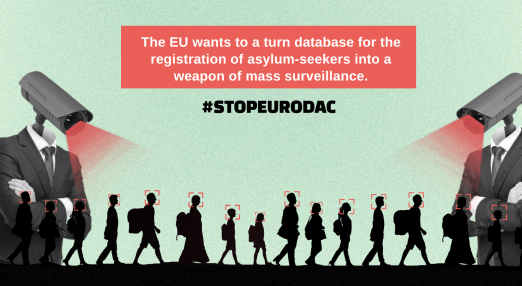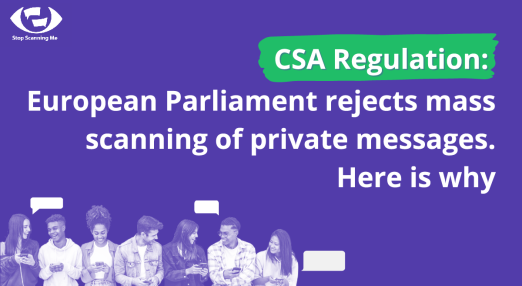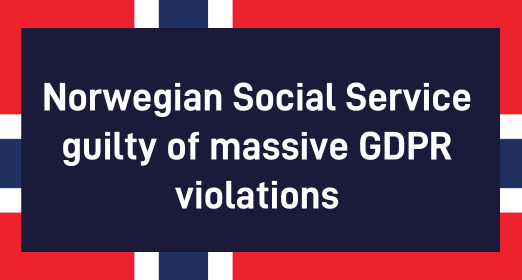Our work
EDRi is the biggest European network defending rights and freedoms online. We work to to challenge private and state actors who abuse their power to control or manipulate the public. We do so by advocating for robust and enforced laws, informing and mobilising people, promoting a healthy and accountable technology market, and building a movement of organisations and individuals committed to digital rights and freedoms in a connected world.
Filter resources
-

Spyware attack attempts on civil society in Serbia
On 30 October 2023, two members of civil society from Serbia received an alert from Apple that they were potential targets of state-sponsored technical attacks. They immediately contacted EDRi member SHARE Foundation after receiving the warning, in order to check if their devices were attacked by any known spyware. These were the first documented cases of attempted sophisticated spyware attacks known to us in Serbia.
Read more
-

New educational videos about AI in media, privacy & digital exclusion. Here is what they show
You can now watch all ten videos about artificial intelligence (AI) in the media, cybersecurity for journalists, but also about digital exclusion and the impact of digitalisation on people with disabilities. This is one of the final outputs of the project „Promoting human rights in the digital era“, which involved members of EDRi Iuridicum Remedium (IuRe) from the Czech Republic and Elektronisk Forpost Norge from Norway.
Read more
-

Civil society calls for an end to the expansion of EU’s EURODAC database
Civil society is calling for an end to the expansion of EURODAC, the EU database for the registration of asylum-seekers. EURODAC is being transformed into an expansive, violent surveillance tool that will treat people seeking protection as crime suspects.
Read more
-

CSAR: European Parliament rejects mass scanning of private messages. Here is why
On 22 November, the European Parliament officially adopted its position on the draft ‘Regulation laying down rules to prevent and combat child sexual abuse’ (CSAR). With strong support for this position from all seven European political groups, this marks a positive development for human rights in one of the most controversial draft European Union (EU) laws in recent memory.
Read more
-

Civil society statement: Council risks failing human rights in the AI Act
In the run up to EU AI Act trilogue negotiation, 16 civil society organisations are urging representatives of the Council of the European Union to effectively regulate the use of AI systems by law enforcement, migration control and national security authorities in the legislation.
Read more
-

Norwegian Social Service guilty of massive GDPR violations
Janne Cecilie Thorenfeldt, living in Norway, discovered that her employer which is also the Norwegian Social Service violated her data protection rights. So she took them to court. Read on to learn what happened.
Read more
-

New paper calls for digital public spaces
In a newly published paper, Zuzanna Warso, a human rights lawyer and a Director of Research at EDRi member Open Future (OF), explains why establishing Digital Public Space is necessary for the realisation of digital rights. Keep reading to learn why.
Read more
-

“8 December” case: why is encryption on trial?
On 3 October, the trial of the so-called “8 December” case began. Seven people are prosecuted for being a “terrorist group”.
Read more
-

AI Act: What happens when lawmakers’ faces get scanned with face recognition algorithms?
EDRi member in Italy Hermes Center simulates face recognition on lawmakers to pressure them for a total ban of remote biometric identification (RBI) in the Artificial Intelligence (AI) Act.
Read more
-

EDRi-gram, 23 November 2023
In this edition, we are looking at the thunderous news of six civil society organisations, including EDRi, taking the European Union’s dangerous content regulation to court. The regulation proposes a dodgy tech solution that empowers the police to censor what you post online. We can stop that. We are also excited to share a new campaign called “Don’t Spy EU” which allows you to scan the faces of European lawmakers with a face recognition algorithm. Lawmakers are the ones in charge of finalising the Artificial Intelligence Act, so let’s make sure they fully understand the risks of biometric surveillance.
Read more
-

The EU wants to make facial recognition history — but it must be done for the right reasons
Whilst civil rights activists have long called for an outright ban, certain EU lawmakers may see the AI Act as an opportunity to claim that they are doing the (human) right(s) thing — and actually doing the opposite.
Read more
-

EU AI Act Trilogues: Status of Fundamental Rights Recommendations
As the EU AI Act negotiations continue, a number of controversial issues remain open. At stake are vital issues including the extent to which general purpose/foundation models are regulated, but also crucially, how far does the AI Act effectively prevent harm from the use of AI for law enforcement, migration, and national security purposes.
Read more
